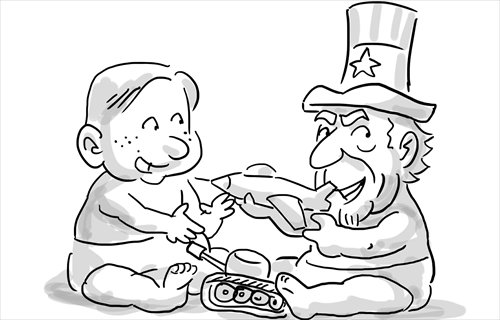Arms embargo lift sends dangerous signal in complicated region

Illustration: Liu Rui/GT
US President Barack Obama announced the end of the US arms embargo against Vietnam after meeting with his Vietnamese counterpart Tran Dai Quang in Hanoi Monday. This is another substantial progress in defense cooperation after the US eased restriction on sales of maritime surveillance and security systems to Vietnam in 2014. This move is seen by Hanoi as a symbol of the normalization of relations with Washington. It's a result of continuously improving bilateral relations, especially in defense cooperation, in the recent years.
However, Washington's future arms sales to Vietnam will still face many restrictions, and thus the lifting of the arms embargo has more symbolic than practical significance, though this is still enough to send dangerous signals given the already-fragile security relations and sophisticated situations in the region.
The lift of arms embargo is fundamentally driven by Washington's policy of rebalancing to the Asia-Pacific region, which aims to counter the rise of emerging powers and safeguard the dominant position of the US in the region. China, as the most significant emerging power in the area, is the main target of its strategy. The maritime disputes between China and some Southeast Asian countries make it easier for the US to promote its rebalancing policy.
From this perspective, the US scraping its long-term arms embargo against Vietnam is targeting China. In recent years, apart from the Philippines' arbitration case against China, international public opinion is dominated by the US accusations against China's construction activities on the Nansha islands and reefs, the Pentagon's patrolling in the name of serving "freedom of navigation," and the US warships and aircraft encountering the Chinese ones in the South China Sea, rather than the voices of China and other South China Sea claimants.
The US views the South China Sea as the frontier of its rebalancing policy, and is stepping toward the frontline in the South China Sea spats. In this sense, the US is gradually shifting its strategy from "offshore balancing" to "inshore balancing." Washington expects to develop friendly ties with more Southeast Asian countries to implement its rebalancing strategy. This is also why Obama announced the end of the arms embargo against Vietnam before his term ends.
Southeast Asian countries' security concerns about China and the South China Sea disputes are important reasons for why the US and Vietnam are considering jointly countering China. This also motivates Vietnam to look for a diplomatic balance among major powers and also a key factor in evaluating why the US-Vietnam defense ties have kept improving during Obama's term.
It's noticeable that as major powers are improving ties with Vietnam, the nation is left with little room to make a choice apart from following balanced diplomacy. On the one hand, Vietnam's diplomats have showcased the nation's determination to expand defense cooperation with the US, yet on the other hand Vietnam's balanced diplomacy will exert significant influence over its arms procurement. Hanoi purchased most of its weapons from Moscow for a long time. To maintain a stable cooperative relationship with Russia, Vietnam will be cautious in purchasing weapons from the US.
In addition, Vietnam's naval and air forces have largely taken shape. Under this situation, it is unwise for Vietnam to irritate China and other countries by purchasing a large number of weapons from the US. Hence, defensive weapons may be the mainstay of future US-Vietnam arms trade, which may include maritime surveillance equipment and patrol ships.
The normalization of US-Vietnam defense relations may complicate the already-fragile security networks in the region. China's rise and Vietnam's vigilance against China have accelerated the development of US-Vietnam defense ties. Washington's lift of the ban is undoubtedly a huge psychological comfort for Hanoi, which may prompt the Vietnamese government to adopt a tougher stance over the South China Sea issue. Obviously, this is not good news for security and peace in the region.
The author is a research fellow with the Charhar Institute and the College of ASEAN Studies at Guangxi University for Nationalities. opinion@globaltimes.com.cn Follow us on Twitter @GTopinion